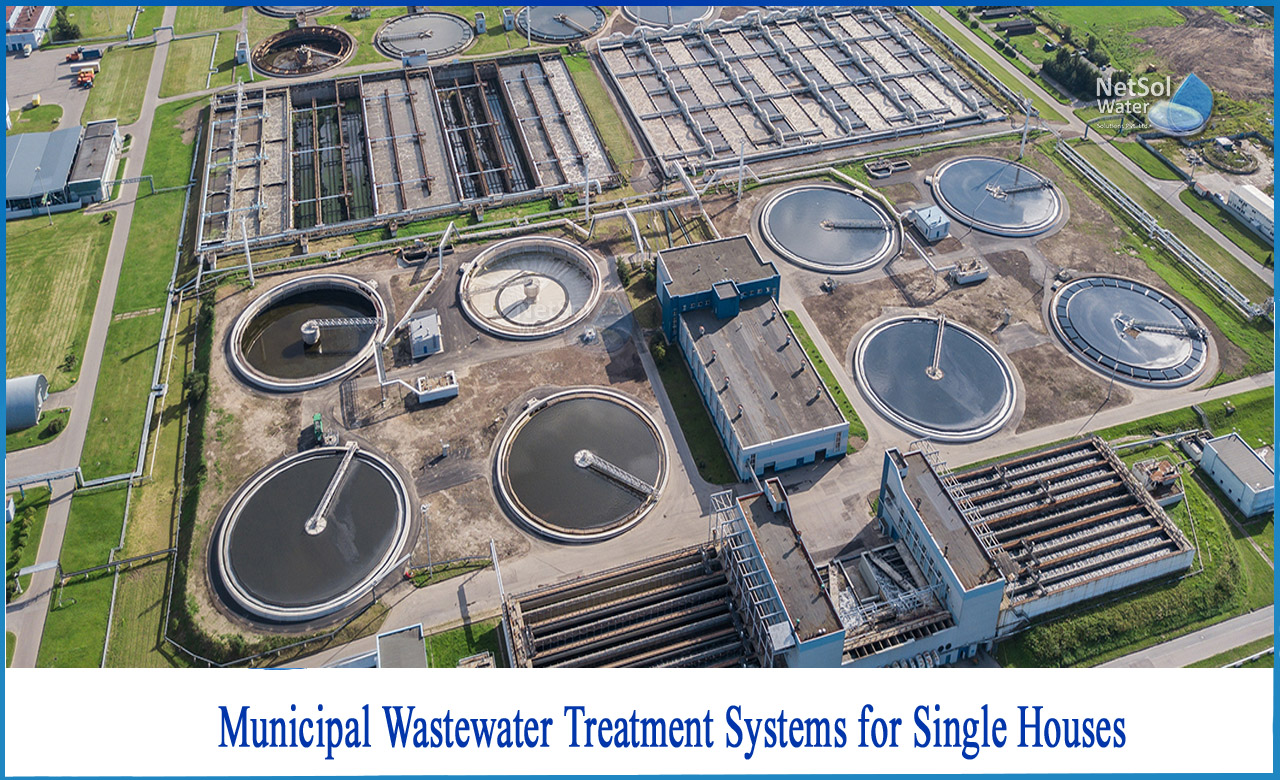What are Municipal Wastewater Treatment systems for Single houses?
The treatment of sewage and wastewater generated by families, local towns, and commercial structures such as schools and hotels are referred to as municipal wastewater treatment systems.
In terms of volumes and loads created, the wastewater generated by each of the aforementioned uses might vary greatly. Hotels for example might have substantial swings in wastewater loadings owing to seasonal variations in tourist numbers. Due to onsite catering and activities, the wastewater created might have greater BOD and COD than usual.Schools have varying flows and loads, with no occupancy overnight or on weekends, as well as lengthy periods of non-use during the summer vacation. The use of toilets at gas stations and highway service stations can be quite high, resulting in high ammonia levels in the effluent.
Due to the increased amount of urban wastewaters and stronger rules imposed on effluent pollutants concentration, municipal wastewater treatment has become one of the most difficult environmental concerns.
Description of the municipal wastewater treatment systems for a single house:
The particular solution for each municipal wastewater treatment application relies directly on the project. The particular solution will change depending on whether the project is a new build or an upgrade of existing septic tanks. The scale of the project will also impact the solution chosen, with packaged municipal wastewater treatment systems being best for certain projects and equipment kits for retrofitting into existing tanks being preferable for others. Our experts and process engineers will work with you to find the best solution for your needs.
A typical municipal wastewater treatment system for a single house can involve the below mentioned units. Each stage is shown clearly by a flowchart as well as with a brief description.
Primary treatment: The purpose of first treatment is to eliminate contaminants that will settle or float in a clarifier tank. In most cases, first treatment removes 60% of the raw sewage suspended particles and 35% of the BOD5. This procedure does not eliminate soluble contaminants.
Secondary treatment: The main purpose of secondary treatment is to remove BOD5 that has escaped the initial process and to offer further suspended solids removal. Biological techniques are commonly used for secondary treatment. These processes might occur in wastewater in a natural way. Secondary treatments, on the other hand, are intended to accelerate these natural processes. Secondary treatment may remove up to 85% of BOD5 and suspended particles, but it does not remove large amounts of nitrogen, phosphorus, or heavy metals, nor does it entirely eliminate harmful bacteria and viruses.
Tertiary treatment: Advance treatments, also known as tertiary wastewater treatment, are typically used when secondary treatment is insufficient. Some of these procedures may remove up to 95% of BOD5 and phosphorus, as well as all suspended particles and microorganisms, and 95% of nitrogen. They may create effluent that is sparkling clean, colourless, and odourless, and looks identical to high-quality drinking water. Filtration or the use of an adsorbent such as activated carbon to remove persistent organic contaminants are examples of these procedures.
To improve phosphorous removal, tertiary treatment may include the use of chemicals such as ferric chloride or alum. In order to facilitate nitrogen removal, a nitrogen control step might be added to the tertiary treatment facility. This phase might be carried out in a biological or chemical manner. Nitrification/denitrification is the biological process. These two processes need the presence of specific kinds of bacteria. Ammonia stripping is a chemical procedure that removes nitrogen from a solution in the form of ammonia by increasing the pH of the solution by adding a base such as lime to convert the ammonium ion to ammonia.
Conclusion
Every application necessitates a solution-oriented, site-specific approach. We have the expertise and experience to provide a cost-effective solution for your upcoming or ongoing project. We promise an engineering solution that will allow you to comply with effluent regulations and fulfil your local discharge licensing requirements. Our designs assure easy and automated operation, no noise or odour, and little sludge generation, regardless of the solution chosen for your application.
Netsol Water is Greater Noida-based leading water & wastewater treatment plant manufacturer. We are industry's most demanding company based on client review and work quality. We are known as best commercial RO plant manufacturers, industrial RO plant manufacturer, sewage treatment plant manufacturer, Water Softener Plant Manufacturers and effluent treatment plant manufacturers. Apart from this 24x7 customer support is our USP. Call on +91-9650608473, or write us at enquiry@netsolwater.com for any support, inquiry or product-purchase related query.



